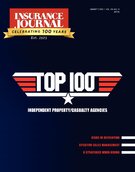Human-to-human (H2H) marketing is a specialized approach that focuses on fostering authentic connections and establishing meaningful relationships with potential customers.
In an era where automation often dominates marketing strategies, it’s crucial to acknowledge the significance of the human element in your interactions.
This principle is especially important in the insurance industry, where trust and personal relationships play a vital role in business development. In fact, human-to-human marketing aligns seamlessly with the needs of our industry.
The effectiveness of H2H marketing extends beyond the boundaries of business-to-consumer (B2C) interactions and applies equally well to business-to-business (B2B) engagements. To incorporate these principles into your marketing campaigns, here are some valuable tips to consider.
1. Reach your customers where they are. An essential aspect of human-to-human marketing is connecting with your customers on their preferred platforms. If your target audience frequently engages on platforms like LinkedIn, for example, it’s crucial to adapt your strategy and find ways to make yourself accessible to them in that specific environment.
2. Foster authentic communication. Authenticity is key in human-to-human marketing, as people connect best with real individuals. You don’t have to strive for perfection in your communications or marketing efforts. In fact, being relatable and transparent can significantly contribute to building trust.
To achieve this, consider adopting a more human and direct approach in your interactions with customers. Engage with your audience by promptly addressing their questions and comments. Avoid using pre-written responses — be genuine and personalized in your communication.
Additionally, don’t shy away from occasionally sharing content that goes beyond the realm of “strictly business.” Inject a personal touch by sharing glimpses of you (or your team’s) life — such as pictures with pets, humorous memes, or images showcasing employees enjoying their work. This kind of content adds a human element to your brand and strengthens the connection with your audience.
3. Embrace active listening! This is the foundation of all marketing efforts from an H2H perspective. Remember that your marketing is not about what your business needs — it’s about what your customer needs. Before planning any marketing initiative or message, consider what your customer wants, what they fear, what their aspirations are, and what keeps them up at night.
It isn’t unusual for companies to put their best foot forward and oversell in an effort to gain customers’ business when designing marketing messages. But listening to your customers — really listening to them — can help you develop the most profound and effective marketing messages, while placing emphasis on what they need instead of what you think or want them to need.
4. Ask open-ended questions. Automation is on the rise, with chatbots replacing in-person customer support and personalized (yet automated) outreach becoming the norm — and we believe there is an application for computer generated service. However, personalization cannot replace genuine human interaction and connection. Engaging in deep, one-on-one conversations with every prospect is challenging when marketing at scale. Nonetheless, you can infuse human-to-human principles into your outreach strategies in various ways.
For example, rather than relying solely on multiple-choice options in surveys and polls for gathering customer feedback, incorporate more open-ended questions. These questions should aim to deepen your understanding instead of simply advancing the customer through your sales funnel.
During personal interviews, expand your focus beyond specific product or brand opinions. Instead, inquire about the challenges individuals face in the insurance industry as a whole. By casting a wider net, you gain insights into their daily struggles and discover how you can better assist them.
5. Be transparent. Nobody’s perfect. Authenticity often means admitting your flaws. Doing this can inspire trust, especially when someone leaves a negative review. Occasional negative reviews are inevitable for most businesses. How you deal with them can reflect very well on you, though, and inspire trust in the person leaving the review and the audience reading. Where possible and appropriate, the H2H ethos suggests you honestly admit your mistake before offering to make amends.
H2H marketing is not always the easiest method. But when done right, you can foster deeper connections that benefit both you and your customers. Actively listen to your prospects, develop a deep understanding of their opinions and challenges, put their needs first — and generate fantastic results.
Was this article valuable?
Here are more articles you may enjoy.



 ChatGPT Fever Spreads to US Workplace, Sounding Alarm for Some
ChatGPT Fever Spreads to US Workplace, Sounding Alarm for Some  Could Georgia Be Next With Major Tort Reform? Kemp Calls for Limits
Could Georgia Be Next With Major Tort Reform? Kemp Calls for Limits  Finance Firms’ Return-to-Office Crackdown Could Backfire: Deloitte
Finance Firms’ Return-to-Office Crackdown Could Backfire: Deloitte  Heritage Insurance Reports Third Straight Quarter of Profit After Shedding Policies
Heritage Insurance Reports Third Straight Quarter of Profit After Shedding Policies 


